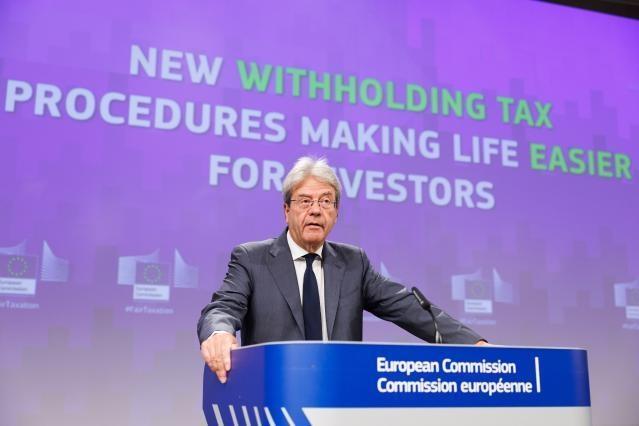
This initiative – a key element of the Communication on Business Taxation for the 21st Century, and the Commission's 2020 Action Plan on the Capital Markets Union – will promote fairer taxation, fight tax fraud, and support cross-border investment throughout the EU.
The term “withholding tax” refers, for example, to the situation where an investor resident in one EU Member State is liable to pay tax on the interest or dividends earned in another Member State. This is often the case for cross-border investors. In such a scenario, in order to avoid double taxation, many EU Member States have signed double taxation treaties, which avoid the same individual or company being taxed twice. These treaties allow a cross-border investor to submit a refund claim for any excess tax paid in another Member State.
The problem is that these refund procedures are often lengthy, costly and cumbersome, causing frustration for investors and discouraging cross-border investment within and into the EU. Currently, the withholding tax procedures applied in each Member State are very different. Investors have to deal with more than 450 different forms across the EU, most of which are only available in national languages. The Cum/Ex and Cum/Cum scandals have also shown how refund procedures can be abused: the tax losses from these practices have been estimated at €150 billion for the years 2000-2020.
Key actions proposed today will make life easier for investors, financial intermediaries and national tax authorities:
- A common EU digital tax residence certificate will make withholding tax relief procedures faster and more efficient. For example, investors with a diversified portfolio in the EU will need only one digital tax residence certificate to reclaim several refunds during the same calendar year. The digital tax residence certificate should be issued within one working day after the submission of a request. At present, most Member States still rely on paper-based procedures.
- Two fast-track procedures complementing the existing standard refund procedure: a “relief at source” procedure and a “quick refund” system, which will make the relief process faster and more harmonised across the EU. Member States will be able to choose which one to use – including a combination of both.
- Under the “relief at source” procedure, the tax rate applied at the time of payment of dividends or interest is directly based on the applicable rules of the double taxation treaty provisions.
- Under the “quick refund” procedure, the initial payment is made taking into account the withholding tax rate of the Member State where the dividends or interest is paid, but the refund for any overpaid taxes is granted within 50 days from the date of payment.
These standardised procedures are estimated to save investors around €5.17 billion per year.
- A standardised reporting obligation will provide national tax administrations with the necessary tools to check eligibility for the reduced rate and to detect potential abuse. Certified financial intermediaries will have to report the payment of dividends or interest to the relevant tax administration so that the latter can trace the transaction. In particular, large EU financial intermediaries will be required to join a national register of certified financial intermediaries. This register will also be open to non-EU and smaller EU financial intermediaries on a voluntary basis. Taxpayers investing in the EU through certified financial intermediaries will benefit from fast-track withholding tax procedures and avoid double taxation on dividend payments. The more financial intermediaries register, the easier it will be for tax authorities to process refund requests, regardless of the procedure used.
Next steps
Once adopted by Member States, the proposal should come into force on 1 January 2027.
Background
Today's proposal is just one of the Commission's initiatives aimed at simplifying procedures for businesses and fighting abusive tax practices. In December 2022, Finance Ministers adopted the Commission proposal a for Council Directive on ensuring a global minimum level of taxation for multinational enterprise groups and large-scale domestic groups in the EU. Moreover, in May 2023, a political agreement was reached on new tax transparency rules for all service providers facilitating crypto-assets transactions for customers residing in the EU. Today's proposal is also a key element of the Commission's Action Plan on the Capital Markets Union 2020.
For more information
Quote(s)
This proposal will further encourage cross-border investment within and into the EU, leading to a stronger, more competitive EU market and a better-functioning Capital Markets Union. This is another step in the right direction, which will make taxation fairer, more user-friendly and updated for our digital world.
Valdis Dombrovskis, Executive Vice-President and Commissioner for Trade - 19/06/2023
Today’s proposal will help ensure cross-border investors are not taxed excessively on dividends and interest payments, giving a much-needed shot in the arm to European capital markets. It will also increase transparency: Member States will be able to check whether the withholding tax rate is applied correctly to each eligible taxpayer and to more effectively tackle abuse. Our proposal demonstrates once again that the EU is committed to making life easier for investors and to transforming our tax systems for the better.
Paolo Gentiloni, Commissioner for Economy - 19/06/2023
Disjointed and largely paper-based tax procedures are costly and they stifle investment across the Single Market. Retail investors are impacted most, as 70% of them do not reclaim the tax refund to which they are entitled. Besides fighting tax fraud, this proposal eases the burden of claiming back tax by cutting red-tape and making the process simpler and faster, both for investors and tax authorities. This proposal removes an obstacle to creating a single market for capital – and in doing so makes an important contribution to Capital Markets Union.
Mairead McGuinness, Commissioner for Financial Services, Financial Stability and Capital Markets Union - 19/06/2023
Details
- Publication date
- 19 June 2023 (Last updated on: 19 June 2023)
- Author
- Representation in Cyprus
